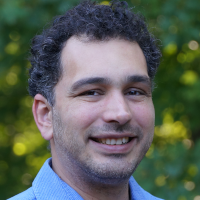Title
Associate Professor of Computer Science
Education
University of Massachusetts Amherst
Ph.D. in Computer Science,
Title: “On the Design of Methods to Estimate Network Characteristics”
Department of Computer Science
Advisor:
Don Towsley
May 2010.
�
Federal University of Rio de Janeiro
B.S. & M.S. in Informatics & Computer Engineering.
March 2001, July 2003
Prior Appointments
Carnegie Mellon University, Pittsburgh, PA
Postdoctoral fellow
Department of Computer Science
Mentor: Christos Faloutsos
June 2013 – 2015.
�
Northeastern University, Boston, MA
Visiting Researcher
Department of Physics
May 2012 – May 2013.
�
University of Massachusetts Amherst, Amherst, MA
Posdoctoral Researcher
Department of Computer Science
Mentor: Don Towsley
May 2010 – May 2013
Research Areas
My research focuses on endowing machine learning algorithms with the ability to learn invariant representations for relational and temporal data for both correlational and counterfactual tasks. Invariances are one of
the most consequential forms of prior knowledge in mathematics, physics, statistics, and also machine learning. An object is invariant if it is the same under some pre-specified set of transformations. For instance,
graphs and tensors often are the same under index permutations (isomorphism), while temporal and spatial
invariances often imply stationarity, and robustness to adversarial attacks is an invariance to perturbations.
Whether designing recommender systems for social networks, building robots that can reason about the
relationships between objects in their surrounding environment, learning to generate new drugs, learning
causal relationships, or extracting logical rules from data examples, invariances are essential for robust automated learning. The outcome of my research has had far-reaching implications, from a principled framework
to perform counterfactual tasks (predicting what-if scenarios), to endowing machine learning models with
world-knowledge.
Key Areas
Data Mining, Network Science, Computer Networks, Statistical Models & Inference
Notable Awards
2021 Best Paper Award ACM CODASPY 2021
2020 NSF CAREER Award
2020 Purdue Seed for Success Award
2020 Purdue College of Science Team Award
2016 Best Paper Award ACM SIGMETRICS’16
2014 Best Paper Award IEEE NetSciCom’14
2004–2009 Brazilian National Scholarship Board (CAPES) Full Fellowship [Ph.D.]
2002–2003 Brazilian National Science Foundation (CNPq) M.S. Scholarship [M.Sc.]
2000–2001 Brazilian National Science Foundation (CNPq) Undergraduate Scholarship.
Biography
The overarching theme of my work is the principled forecasting, measurement, analysis, and mining of large-scale complex social and communication systems. Networks are everywhere as they naturally frame some of the highest impact computing applications: from online social networking, to Web search, to product recommendations, to mobile ad-hoc networking. My research blends practical issues with theory, focused on how new theoretical results can advance novel applications.
